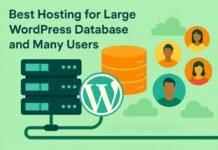Launching a podcast website isn’t just about uploading episodes — it’s about building a long-term platform that can grow as your audience expands. Unlike blogs or image-based sites, podcasts depend heavily on high-quality audio files, which consume a large amount of storage and bandwidth.
Each episode might range between 50 MB to 200 MB, and when you multiply that by dozens or even hundreds of episodes, storage demand skyrockets. If your web host imposes strict limits, you’ll quickly run into problems — either paying extra for space, compressing files (and losing audio quality), or deleting older episodes.
That’s why unlimited storage for audio becomes a crucial factor for podcasters who want both freedom and scalability. It ensures you can keep every episode live and accessible to new listeners without worrying about data caps or performance drops.
How Unlimited Storage and Bandwidth Benefit Podcasters
Unlimited storage doesn’t only mean “infinite space” — it also indicates a host that understands the data demands of streaming and downloads.
Here’s how it benefits your podcast website:
- Higher listener satisfaction: Fast delivery and uninterrupted streaming improve user experience.
- SEO advantages: Search engines reward websites that load quickly and remain stable under heavy traffic.
- Long-term scalability: You can archive old episodes while continuously adding new ones without reconfiguring your hosting.
- Reduced cost-per-episode: Instead of paying per GB or per-month for extra files, you pay a flat hosting fee.
However, the phrase “unlimited” is often marketing language — in practice, hosts impose fair-use policies or soft limits. That’s why, before purchasing, always check the Terms of Service to see how “unlimited” actually works.
Typical Pitfalls with Standard Hosting Plans

Many creators start by uploading podcast episodes to the same hosting they use for their WordPress blog. At first, it seems convenient — but soon, limitations appear:
- Storage caps: Basic plans usually offer only 10 GB – 50 GB.
- Bandwidth throttling: If hundreds of listeners stream simultaneously, your site may slow down or even crash.
- Lack of media optimization: General web hosts aren’t tuned for large-file delivery or streaming protocols.
- No analytics integration: You can’t easily track downloads, listener locations, or episode performance.
As a result, your audience experience suffers, and your growth potential stalls.
To truly scale a podcast brand, you need hosting optimized for media performance, reliability, and unlimited audio storage — not just any generic shared hosting.
Unlimited Storage vs. “Practically Unlimited” — What It Really Means
When hosting companies advertise “unlimited storage,” they usually mean no preset cap on disk usage — but that doesn’t mean infinite space. Most use a fair use policy, which restricts extremely large file hosting (like raw archives or backup dumps).
For podcasters, this is critical. You want a host that allows consistent audio uploads without throttling or hidden restrictions. Before choosing, check for these terms in the fine print:
- “Unlimited storage for web files only” → acceptable.
- “Not for media streaming or file distribution” → red flag 🚩.
- “Subject to resource usage limits (CPU/I/O)” → manageable but worth monitoring.
✅ Ideal hosts for podcast storage (examples):
- Hostinger Business / Cloud plans: affordable, high bandwidth, fast SSD servers.
- DreamHost Shared Unlimited: truly no cap on files or bandwidth, suitable for long-term podcasts.
- A2 Hosting Turbo Boost: optimized for media delivery and WordPress sites with caching support.
The key takeaway — “unlimited” is fine as long as it includes audio files in its fair-use policy.
Bandwidth, Downloads & Delivery Speed
Bandwidth determines how many listeners can stream or download your podcast simultaneously. If your hosting can’t handle it, you’ll face slow loading or episode cutoffs.
To calculate minimum needs:
If 1 episode = 100 MB and you expect 10,000 monthly downloads → that’s 1 TB bandwidth per month already. So even “mid-tier” plans can hit limits quickly.
That’s why podcasters should pick hosts offering:
- Unmetered bandwidth (no fixed GB limit).
- Optimized caching layers for media (reduces repeated downloads).
- Solid-state drives (SSD) for faster delivery.
Also verify if your host uses HTTP/2 or LiteSpeed technology — both drastically improve speed for audio-heavy sites.
CDN, Caching & Geo-Distribution for Global Listeners
Your podcast isn’t limited by geography — but your hosting server is. If your host’s data center is in the U.S., international listeners (Europe, Asia) may experience buffering.
That’s where a Content Delivery Network (CDN) steps in.
A CDN replicates your audio files across multiple global nodes so every listener gets the episode from the nearest server — improving both speed and SEO rankings.
Best CDN options for podcasts:
- Cloudflare CDN: free, simple integration with WordPress.
- Bunny.net: inexpensive and fast global distribution.
- Amazon CloudFront: enterprise-level CDN for very large audiences.
CDN also reduces bandwidth pressure on your origin server, keeping your hosting plan within limits.
Integrations: RSS Feeds, Embed Players, and Podcast Directories
Your hosting environment must make it easy to publish and distribute your episodes automatically.
Look for hosts that support:
- WordPress podcast plugins like Seriously Simple Podcasting or PowerPress.
- Automatic RSS feed generation — this feed is how Apple Podcasts, Spotify, and Google Podcasts discover new episodes.
- Embed player support — so visitors can play directly on your site.
- Easy directory submission tools — allowing your show to appear across platforms effortlessly.
Without these integrations, you’ll spend hours managing technical distribution manually — a huge time waste for creators.
Shared, VPS, Cloud, and Dedicated Hosting Options

Every podcaster’s journey starts somewhere small — but not every hosting type fits every stage of growth. Understanding the difference between shared, VPS, cloud, and dedicated hosting can save you time, frustration, and money.
1. Shared Hosting (Beginner Level)
This is the most affordable option (typically $3–$10/month). Your website shares the same server resources with dozens of other users.
✅ Best for: new podcasters with fewer than 20 episodes and low traffic.
❌ Not ideal for: heavy audio traffic or multiple podcast series.
Over time, limited CPU power and storage restrictions will slow your site as your library expands.
2. VPS Hosting (Intermediate Level)
Virtual Private Servers (VPS) offer more control and dedicated resources.
✅ Best for: medium-sized podcasts with consistent listeners (10K–50K monthly downloads).
❌ Downside: requires some technical setup (root access, OS management).
Pricing starts around $20–$40/month, depending on storage and bandwidth.
3. Cloud Hosting (Scalable Solution)
Cloud hosting (like Hostinger Cloud, SiteGround Cloud, or AWS Lightsail) uses distributed servers to handle load spikes efficiently.
✅ Best for: growing podcasts, multiple hosts, or video+audio content.
✅ Scalable: pay only for what you use — perfect for unpredictable traffic spikes after a viral episode.
❌ Slightly more expensive (usually $30–$70/month).
4. Dedicated Hosting (Enterprise Level)
A full physical server just for your podcast brand — offering unlimited customization, highest performance, and reliability.
✅ Best for: podcast networks, agencies, or commercial media publishers.
❌ Overkill for beginners — costs $100–$300/month or more.
Podcast-Specific Hosting Platforms Offering Unlimited Audio Storage
If you don’t want to handle technical setup or server management, podcast-specific hosts can be smarter choices. These are purpose-built for audio creators and often include analytics, distribution, and monetization tools.
Top examples include:
| Platform | Storage | Key Features | Price Range |
|---|---|---|---|
| Podbean Unlimited Plus | Unlimited | Bandwidth + Monetization + Analytics | $14–$29/month |
| Buzzsprout | Limited free, paid tiers | Episode scheduling, analytics | $12–$24/month |
| Transistor.fm | Unlimited podcasts per account | Team management, private feeds | $19–$49/month |
| Captivate.fm | Unlimited uploads | Marketing suite + dynamic ad insertion | $17–$44/month |
These platforms typically store your audio files on optimized media servers — meaning you don’t have to worry about technical details like bandwidth, CDN, or caching. However, you often lose full website control compared to self-hosting WordPress on a regular host.
Platform vs. Generic Web Host: Which Is Better?
Let’s pressure-test both options:
| Criteria | Podcast-Specific Host | Generic Web Host (e.g., DreamHost, Hostinger) |
|---|---|---|
| Ease of setup | Simple, plug & play | Requires WordPress setup |
| Audio optimization | Built-in CDN, auto compression | Manual integration needed |
| Analytics | Integrated listener stats | Use plugins or third-party tools |
| Customization | Limited website control | Full site freedom |
| Cost | $10–$30/month | $5–$25/month (plus plugin costs) |
✅ Best hybrid approach:
Use a generic web host for your website (WordPress) and a podcast host (Podbean / Transistor) for your audio files — then embed the episodes on your site.
This gives you both creative control and media reliability.
Budget Considerations and Scaling From “Easy Start” to “High Volume”
Your hosting needs evolve as your audience grows:
| Stage | Monthly Listeners | Recommended Hosting | Approx. Cost |
|---|---|---|---|
| Beginner | < 10K | Shared or Podbean Basic | $5–$15 |
| Intermediate | 10K–50K | VPS or Transistor.fm | $20–$40 |
| Professional | 50K–200K | Cloud Hosting + CDN | $50–$100 |
| Enterprise | 200K+ | Dedicated or AWS CloudFront | $100+ |
👉 Tip: Always plan 2–3 steps ahead. Migrating hosts repeatedly can cause feed disruptions and SEO ranking loss.
SEO Implications of Hosting Choice for a Podcast Website
Your hosting provider directly influences your search engine visibility. Google’s algorithm increasingly prioritizes site speed, uptime, mobile performance, and security — all of which are hosting-dependent.
A slow or unstable podcast site doesn’t just frustrate listeners; it also hurts rankings on Google, Apple Podcasts, and Spotify directories (which indirectly use web speed for indexing).
✅ Key SEO-friendly hosting factors:
99.9% uptime or higher
Fast Time-to-First-Byte (TTFB) under 500ms
HTTP/2 or LiteSpeed support
Integrated SSL (HTTPS)
CDN availability
If your host fails to meet these, your website could slip behind competitors even if your content quality is strong.
Site Speed, Mobile Friendliness & Secure Delivery (HTTPS)
Audio-heavy websites can become sluggish if not optimized properly. Every MB matters when loading pages on mobile.
To maintain fast and secure delivery:
Enable browser caching — store static elements like thumbnails and player scripts locally.
Use a lightweight WordPress theme optimized for Core Web Vitals (e.g., Astra, GeneratePress).
Compress thumbnails & artwork (JPG or WebP) to minimize load times.
Use HTTPS with free SSL (Let’s Encrypt) — ensures trustworthiness and better Google ranking.
Host audio externally (via CDN or podcast host) and embed episodes instead of self-hosting them directly.
If you store every audio file locally, your site’s loading time and database queries will skyrocket — killing your SEO performance.
Structured Data for Podcasts, Sitemaps & Schema Markup
Google now recognizes Podcast schema — a structured data format that helps search engines understand your episodes and display them in rich results (with play buttons or episode lists).
You can implement this easily using:
Podcast Schema Plugin for WordPress
Yoast SEO’s Podcast Support (premium version)
Or manually add
PodcastEpisodeJSON-LD markup
Include details like:
Episode title, duration, and description
Publish date
Audio URL
Thumbnail or cover art
Also, generate a podcast sitemap (via PowerPress or Rank Math) to help Google index all episodes efficiently.
Hosting Continuity, Backups & Migration Planning
Podcasts are long-term projects — and losing your audio archive would be devastating. That’s why hosting continuity and backups are non-negotiable.
Here’s what to ensure before committing to a host:
Daily backups: Full-site and file backups at least once per day.
Offsite redundancy: Backup copies stored on a separate server (e.g., Google Drive or AWS S3).
One-click restoration: Ability to recover site instantly if a plugin or update breaks it.
Migration assistance: Free site migration support helps move smoothly from old host to new without losing SEO or subscribers.
If your host lacks automated backup, install a plugin like UpdraftPlus or JetBackup — they’re life-savers during migration.
Bonus Tip – Audio File Delivery Optimization
Even with unlimited storage, how you deliver your audio matters:
Serve MP3 files via HTTP/2 for multiplexing and faster load.
Enable GZIP compression on your server for metadata and scripts.
Use lazy-loading for embedded players (so page loads first, audio loads after).
These micro-optimizations can cut page load times by 30-50%, which directly boosts user retention and search ranking.
How to Migrate Your Existing Podcast Site to Unlimited Storage Hosting
Migrating a podcast website isn’t like moving a simple blog.
You’re dealing with large audio files, active RSS feeds, subscriber links, and SEO-indexed pages — so one small mistake can cause listeners to lose access to your show.
Follow this step-by-step migration framework:
Take full backups of both your WordPress files and your database. (Use UpdraftPlus or All-in-One WP Migration.)
Export all RSS feeds — these contain episode metadata, timestamps, and platform connections.
Choose your new unlimited-storage host (like DreamHost Unlimited, Hostinger Cloud, or Podbean Unlimited Plus).
Install WordPress on the new host and restore your backup.
Verify permalinks and media paths. Old episode URLs must remain identical; otherwise, you’ll lose your ranking.
Update DNS records — point your domain to the new host’s nameservers. (DNS propagation may take up to 24 hours.)
Monitor 404 errors using Google Search Console to catch any broken links early.
💡 Pro tip: keep your old hosting active for 3–5 days after migration. This ensures listeners accessing older cached feeds still receive your episodes without downtime.
Redirects, RSS Feed Continuity & Keeping Download Stats
Your RSS feed is your podcast’s lifeline — Apple Podcasts, Spotify, and Google all pull new episodes from it.
When migrating, preserving that feed is non-negotiable.
Here’s how to maintain continuity:
Keep the same feed URL (e.g.,
https://yourdomain.com/feed/podcast).If the feed path changes, set a 301 redirect from the old to the new feed.
Use a “Redirect” plugin in WordPress or configure
.htaccessfor Apache servers.After migration, test your feed using Podba.se Validator.
To retain your historical download statistics, export them from your old host (Podbean, Buzzsprout, etc.) and import to your new platform.
If that’s unavailable, start tracking fresh data via Google Analytics 4 or Chartable.
Monitoring Growth, Analytics & Cost Traps
Once your site is stable, focus on data-driven management.
Podcasters often ignore analytics after launch — a costly mistake.
Key metrics to track:
Total monthly downloads per episode
Average listener retention time
Device & geography breakdown (mobile vs desktop)
New vs returning listeners
Bandwidth usage spikes
Tools like Chartable, Podtrac, and Google Analytics 4 can visualize these patterns.
Also, regularly audit your hosting invoices — some providers silently charge for overages when traffic spikes.
Set up automatic alerts for bandwidth and storage thresholds to avoid surprise costs.
Best Practices for Archiving Older Episodes & Metadata Hygiene
Over time, your library will expand to hundreds of episodes. Without proper structure, it becomes chaotic.
✅ Best long-term practices:
Archive older seasons into categorized folders (Season 1, Season 2, etc.) for easier management.
Retain episode metadata (titles, descriptions, tags) inside a spreadsheet or CMS backup.
Use consistent naming like
podcast-episode-001.mp3instead of random file names.Embed ID3 tags in all MP3 files — these help podcast players show artwork and details correctly.
Compress older files using 128 kbps bitrate (saves space without major quality loss).
Use long-term cloud backups (Google Drive, Dropbox, or AWS S3) apart from your web host.
This ensures even if your hosting ever fails, your full audio archive remains intact and easily recoverable.
10 Practical Tips for Choosing and Using Unlimited Storage Hosting for Podcasts
Even if a hosting company promises “unlimited,” not all of them are built equally. These 10 rules will help you make the smartest possible decision — balancing performance, scalability, and long-term cost efficiency.
Always read the fine print.
Verify that “unlimited storage” includes media files (many exclude audio/video from that policy).Prioritize uptime and speed.
Go for hosts with 99.9%+ uptime and low latency servers. Google rewards fast, stable websites.Use SSD-powered hosting.
SSDs handle thousands of concurrent downloads far better than HDD-based servers.Integrate a CDN early.
Cloudflare or Bunny.net dramatically reduce buffering and increase international reach.Keep audio separate from website data.
Host WordPress + visuals on your main server, but offload MP3s to a podcast host or CDN.Automate your backups.
Daily, incremental backups (both site and media) ensure zero data loss even during migration.Implement caching & compression.
Tools like WP Rocket or LiteSpeed Cache keep your website blazing fast despite heavy content.Maintain feed consistency.
Never change your podcast RSS URL once public. Use 301 redirects if absolutely necessary.Track analytics religiously.
Regularly review episode downloads, retention rates, and storage consumption.Plan 12 months ahead.
Don’t just buy for today’s needs — anticipate double your current audience and storage demand.
Checklist: What to Ask Before Choosing a Host
When shortlisting hosts for your podcast website, ask these 7 strategic questions:
Do you allow unlimited audio storage and streaming under your fair-use terms?
What’s your average response time and server uptime record?
Is CDN included, or will I integrate my own?
How do you handle traffic spikes during viral episodes?
Are automatic backups and restores included?
Can you migrate my site without RSS feed disruption?
What’s the renewal cost after the first year?
If a host can answer all seven confidently, it’s a solid candidate for long-term podcasting.
My Recommendation: When to Use Generic Hosting vs. Podcast-Specific Hosting
Let’s simplify your decision:
| Scenario | Recommended Hosting Type | Example Providers |
|---|---|---|
| You want full website control (WordPress, blog, SEO) | Generic Web Host + CDN | DreamHost Unlimited, Hostinger Cloud, A2 Turbo |
| You want zero technical work, just publish episodes | Podcast Hosting Platform | Podbean, Transistor.fm, Captivate.fm |
| You want hybrid control (WordPress + embedded podcast) | Self-host WordPress + External Audio Host | WP Engine + Podbean |
| You plan to scale to millions of downloads | Cloud or Dedicated | AWS Lightsail, Kinsta, Cloudways |
💡 Pro Tip:
If you’re monetizing or planning to run ads, choose a hybrid approach — it gives you analytics freedom and website control for sponsor integrations.
Final Thoughts & Next Steps
Launching a podcast is easy — building a scalable, listener-friendly, and SEO-optimized home for it isn’t.
Your hosting choice will determine not only your site’s reliability but also your brand reputation and growth ceiling.
To summarize:
Go for a trusted host with clear policies on audio storage.
Combine it with CDN + caching for speed.
Keep automated backups and a clean RSS feed.
Review performance and bandwidth every 3–6 months.
The goal isn’t just to store episodes — it’s to create a permanent, frictionless platform that supports your voice for years to come.



